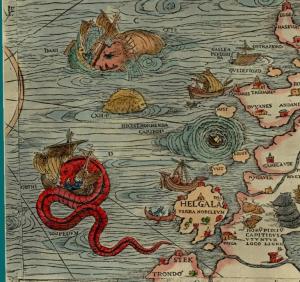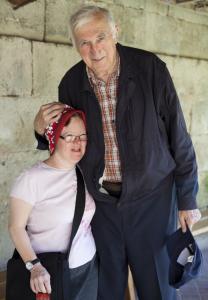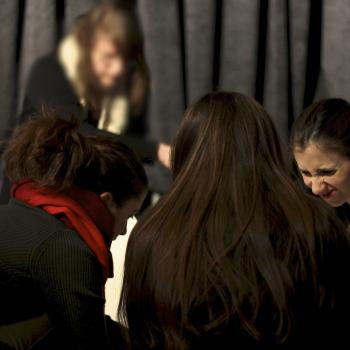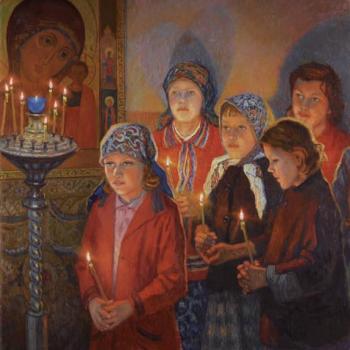During the planning and preparation for the Convivium workshop weekend (November 9-11, 2018; theme: Terra Incognita), I spent many hours wondering about the needs of artists, musicians, writers, and readers and how we might prepare a space where those needs could be honored. In contemplating these questions, two of my heroes came to mind: Mother Elvira Petrozzi, who founded Comunità Cenacolo, and Jean Vanier, the founder of L’Arche.
Two Important Models
Cenacolo, begun in 1983, offers an extraordinary method for combatting addictions: Mother Elvira insists that Cenacolo is not a drug rehabilitation center, nor a “program,” but rather, a “School of Life,” where young addicts live in a community characterized by discipline, prayer, work, true friendship, and learning the value of sacrifice. She once wrote:
Today we suffer a deadly cancer: the incapacity to love. If you do not love, you remain in death. You are not truly alive. If you do not authentically love, you do not suffer, struggle, or cry, but you also never rejoice. If you do not love, you are indifferent! Often though, the one who does not know how to love has not known the One true Love, has not known Him who captures your heart and turns you again toward life, who makes you explode with the will to love. Yes, Love generates love, and today there is an immense need of persons able to generate hope in Love.
– Mother Elvira Petrozzi
Jean Vanier began the work of L’Arche when he moved into a home with Raphaël Simi and Philippe Seux, two men with intellectual disabilities: “The secret of L’Arche is relationship: meeting people, not through the filters of certitudes, ideologies, idealism, or judgments, but heart to heart; listening to people with their pain, their joy, their hope, their history, listening to their heart beats (Jean Vanier).” Now there are over 140 L’Arche communities world-wide. Each of these follows certain aims and fundamental principles, including:
if human beings are to develop their abilities and talents to the full, realizing all their potential as individuals, they need an environment that fosters personal growth. They need to form relationships with others within families and communities. They need to live in an atmosphere of trust, security, and mutual affection. They need to be valued, accepted, and supported in real and warm relationships.
– Charter of the Communities of L’Arche
Mother Elvira recognized that addicts need a place where life has structure and meaning and where they can do work with demonstrable value for others. Jean Vanier, meanwhile, discovered that we are each made for relationship and that the capacity to be vulnerable with others is the true source of strength. Both visionaries share one crowning insight: human beings have an immense need to belong and to share life with others in community.
As it turns out, the needs of writers and artists are remarkably similar to those of addicts and people with mental disabilities.
Terra Incognita
There is a point of arrival but no way. – Franz Kafka
It is undeniable that there is an “unknown” (the geographers of ancient times traced the outline of what amounts to an analogue of this unknown with the famous expression terra incognita that marked the edge of their great sheet – along the margins of the sheet they wrote terra incognita, “unknown land”). At the edge of reality that the eye embraces, the heart feels, and the mind imagines, there is an unknown. Everyone feels it. Everyone has always felt it. Throughout the ages, we have felt it so strongly that we have also imagined it. In every age, we have sought, through our ponderings or fantasies, to imagine, to fix the face of this unknown. In his Germania, Tacitus described the religious feeling that distinguished the ancient Teutons thus: “secretum illud quod sola reverentia vident, hoc deum appellant” (that mysterious thing which they intuited with fear and trembling, this they called God).
– Luigi Giussani
This passage inspired our approach to organizing the 2018 Convivium workshop and provided us with our theme, Terra Incognita. In addition to attracting amazing speakers and some fascinating paper proposals and roundtable topics, the theme helped us to articulate our desire to explore unknown territory. We also wanted to express our willingness to wrestle with the question of the divine’s place in the arts. Most of all, though, we hoped that our theme would help us to see, with new eyes, every limited and familiar thing as herald and sign of the eternal.
What Do Artists Need?
I’d like to discuss three different needs that seem particularly acute for artists.
The first of these is an “enormous room.” The reference is to a book by E.E. Cummings called, The Enormous Room, published in 1922. This autobiographical work describes Cummings’ imprisonment in France during World War I, and the “Room” the title refers to is the barracks where Cummings was incarcerated along with about 30 other prisoners. The enormous room that writers and artists need would not be a prison! Rather it should be a room where people may come and go freely, as they choose. This room is also something quite different from the “room of one’s own,” which Virginia Woolf advocated for and which is absolutely essential for any creative activity; Woolf’s room of one’s own is a given. This “enormous room,” is no less necessary.
The second need is for food, but not just any kind of food. While the food in the enormous room might be delicious, this would not be its most important quality.
The third need is for music: this music includes both compositions that may be perceived by the ear, but also the kind of “music” we can make with the spoken word, or that “sings” in the silence of paint, or marble, or curved banisters.
The Enormous Room
E.E. Cummings was no ordinary prisoner, and the way that he experienced and narrated his incarceration makes the enormous room important for the creative process, even in free people. For Cummings, the enormous room became a symbol for memory, for the space where he could keep the companionship of his fellow inmates alive. The enormous room held Cummings’ likewise enormous affection for all those with whom he shared it. The quality of the friendships formed within that enormous room also provides an insight into the needs of artists.
Each of us carries multitudes within. These throngs could become, over time, a faceless and colorless mob; sometimes it’s less painful to allow this degradation to happen, where memory breaks down the sharp edges of detail and leaves only a melted, vague mass of humanity. For writers and artists, however, decomposition is worse than death. Those details make a work come to life. Distinguishing between one face and another, even between one subtle expression on a particular face and the mere flicker of features that alters its meaning, could transform the essence of a story from ordinary to sublime. As Cummings’ notes, when describing his fellow prisoner, The Schoolmaster, in The Enormous Room: “Lessons hide in his wrinkles…” Artists and writers need the enormous room in order to keep track of all the lessons that hide in each wrinkle.
Even more than lessons, though, the enormous room preserves and enlarges the affections among those who inhabit it. Cummings’ genius with words comes in second to his particular gift of tenderness for the subjects he writes about, even his captors. For example, during his entrance interview, he describes the petty official who interrogated him:
[He] looked as if he was trying very hard, with the aid of his beribboned glasses and librarian’s jacket (not to mention a very ponderous gold watch-chain and locket that were supported by his copious equator), to appear possessed of the solemnity necessarily emanating from his lofty and responsible office. This solemnity, however, met its Waterloo in his frank and stupid eyes, not to say his trilogy of cheerful chins–so much so that I felt like crying ‘Wie gehts!’ and cracking him on his huge back. Such an animal! A contented animal, a bulbous animal; the only living hippopotamus in captivity, fresh from the Nile.
He contemplated me with a natural, under the circumstances, curiosity. He even naively contemplated me. As if I were hay. My hay-coloured head perhaps pleased him, as a hippopotamus. He would perhaps eat me. He grunted, exposing tobacco-yellow tusks, and his tiny eyes twittered. – from The Enormous Room, by E.E. Cummings
The impulse to “crack him on the back” and cry out, “How are you?” in German brings silliness into a humiliating situation. Cummings gives us burlesque, even as he dances in the arena of his own prison. When Cummings turns his attention to his fellow prisoners, his affection deepens:
And I wondered that France should have a use for Monsieur Auguste, who had been arrested (because he was a Russian) when his fellow munition workers made la grève [a strike], and whose wife wanted him in Paris because she was hungry and because their child was getting to look queer and white. Monsieur Auguste, that desperate ruffian exactly five feet tall who—when he could not keep from crying (one must think about one’s wife or even one’s child once or twice, I merely presume, if one loves them) … -used to, start up and cry out, taking B. by one arm and me by the other:
‘Al-lons, mes amis! Chantons “Quackquackquack.”‘ [Come, my friends, let’s sing the “Quackquackquack”] Whereupon we would join in the following song, which Monsieur Auguste had taught us with great care, and whose renditions gave him unspeakable delight:
…’finirons nos desseins,
…………………………Quack.
……………………………….Quack.
……………………………………Quack.
………………………………………….Qua-
…………………………………………………ck.’
I suppose I will always puzzle over the ecstasies of That Wonderful Duck. And how Monsieur Auguste, the merest gnome of a man, would bend backwards in absolute laughter at this song’s spirited conclusion upon a note so low as to wither us all.
I wish I could reprint Cummings’ depictions of all his other fellow inmates: the Schoolmaster, Orange Cap, the Zulu, Emile the Bum, the Silent Man, the seeker of cigarette ends, the Turk, the Bear, and many others, who all received similar, loving treatment from Cummings’ pen, but you can read them here.
We’re all, more or less, thrown together with a raft of characters, most of whom we would not have chosen for company. Out of these personalities, we can either make art or a living hell. Out of the hell of his confinement, Cummings made a love poem for a good number of men he would never see again. His is the room where memory sharpens affection’s focus and gives back art.
Food
Not just any food, no matter how exquisitely prepared or how locally-sourced and organic the ingredients, will satisfy the deepest needs of writers and artists. In The Hiding Place, an autobiographical account, this time by concentration camp survivor Corrie Ten Boom, Corrie and her sister Betsie arrive at Ravensbrück camp and are able, against steep odds, to hang on to their Bible and a bottle of precious vitamin drops:
My instinct was always to hoard [the vitamin drops] – Betsie was growing so very weak! But others were ill as well. It was hard to say no to eyes that burned with fever, hands that shook with chill. I tried to save it for the very weakest – but even these soon numbered fifteen, twenty, twenty-five…
And still, every time I tilted the little bottle, a drop appeared at the top of the glass stopper. It just couldn’t be! I held it up to the light, trying to see how much was left, but the dark brown glass was too thick to see through.
Music
The “Quackquackquack” song provided a kind of oxygen, without which the enormous room’s inhabitants would have asphyxiated from lack of joy. Likewise, without Betsie’s hymns, which she sang despite the ugliest of circumstances, those vitamin drops would have dried up. To conclude my welcoming remarks at the Convivium workshop, I sang a short song for everyone. If you want to hear me sing, you’ll have to come to the next Convivium workshop (but I make no promises!).
The impulse to song, including when music takes the form of the visual arts or written word, must be present, or even the best memory, the most playful description of one’s tormentors, or the most noble impulse to share will fall flat. Love needs to be set to music before we can play it.















